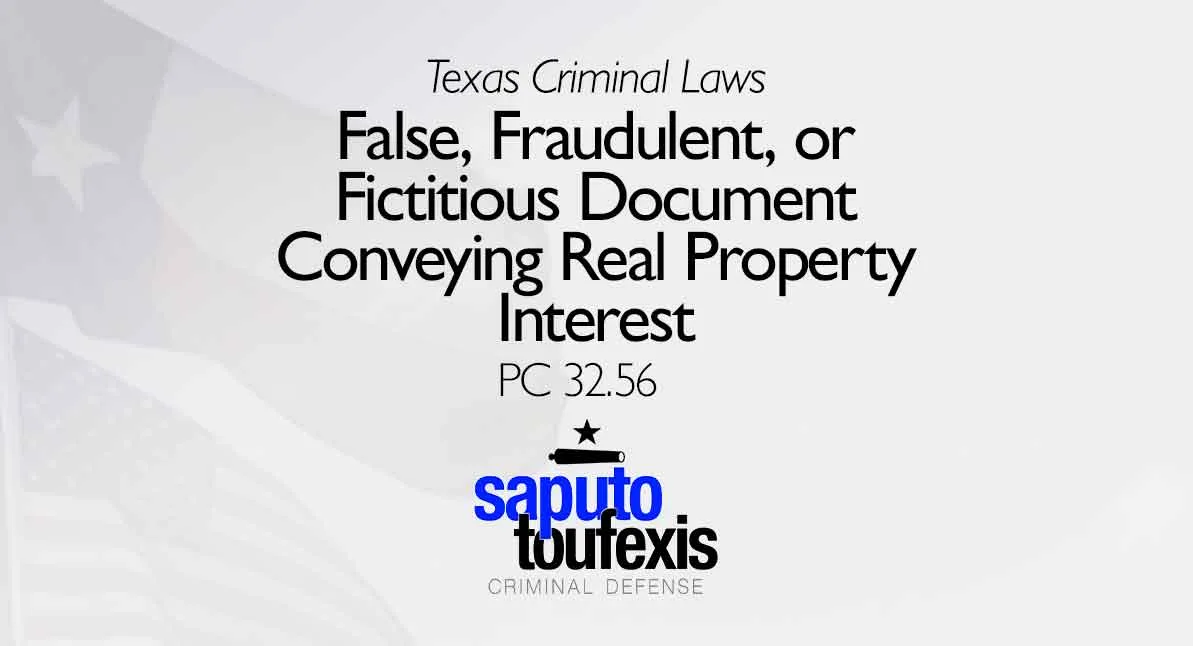The Texas False, Fraudulent, or Fictitious Document Conveying Real Property Interest law gives police the right to arrest you if they believe you knowingly presented a fake or falsified lease, deed, or other instrument that claims to convey a real property interest, and you did so to enter or remain on that property.
FAQs about the
False, Fraudulent, or Fictitious Document Conveying Real Property Interest law in Texas
- What is the current Texas law about False, Fraudulent, or Fictitious Document Conveying Real Property Interest?
- What is the penalty for a Texas False, Fraudulent, or Fictitious Document Conveying Real Property Interest offense?
- How can I be charged with a False, Fraudulent, or Fictitious Document Conveying Real Property Interest offense in Texas?
- What is the statute of limitations for False, Fraudulent, or Fictitious Document Conveying Real Property Interest in Texas?
- Can you get probation for False, Fraudulent, or Fictitious Document Conveying Real Property Interest in Texas?
- What level of crime is False, Fraudulent, or Fictitious Document Conveying Real Property Interest in Texas?
The 89th Legislature enacted this law in 2025. This offense is codified in Penal Code Section 32.56 and takes effect September 1, 2025. It targets situations where a person uses sham real-estate paperwork—like bogus leases or deeds—to get in or stay in a house or other real property.
Have you been charged with False, Fraudulent, or Fictitious Document Conveying Real Property Interest? Contact us today to discuss legal representation.
or Text or Call (888) 239-9305
The statute requires that the person knowingly present a false, fraudulent, or fictitious instrument and that they do so with the intent to enter or remain on the property. It is aimed at document-based schemes rather than simple trespass, and it can apply even if no money changes hands.
Important: in 2025 the legislature carelessly created four different, unrelated offenses all numbered Section 32.56. As of September 1, 2025, there are four separate Section 32.56 statutes, so always confirm which one applies to your case.
The Penal Code classifies the Texas False, Fraudulent, or Fictitious Document Conveying Real Property Interest law under Title 7 “Offenses Against Property,” Chapter 32 “Fraud.” Learn more about the Texas offense of False, Fraudulent, or Fictitious Document Conveying Real Property Interest below.
What is the current Texas law about False, Fraudulent, or Fictitious Document Conveying Real Property Interest?
AV Preeminent Texas lawyer Paul Saputo provides the current law defining False, Fraudulent, or Fictitious Document Conveying Real Property Interest in Penal Code Section §32.56, as follows:[1]
(a) A person commits an offense if, with intent to enter or remain on real property, the person knowingly presents to another person a false, fraudulent, or fictitious document purporting to be a lease agreement, deed, or other instrument conveying real property or an interest in real property.
A person commits this offense by knowingly presenting a false, fraudulent, or fictitious document that purports to be a lease, deed, or other instrument conveying real property or an interest in real property, and doing so with the intent to enter or remain on the property.[2]
If the same conduct also violates another law, the actor may be prosecuted under this section, the other law, or both.[3]
This law takes effect September 1, 2025, and applies to conduct occurring on or after that date.[4]
Important: in 2025 the legislature enacted four different offenses all numbered Section 32.56. Ensure you are reviewing the correct provision titled False, Fraudulent, or Fictitious Document Conveying Real Property Interest.
What is the penalty for a Texas False, Fraudulent, or Fictitious Document Conveying Real Property Interest offense?
The Penal Code classifies this offense as a Class A misdemeanor.[5]
A Class A misdemeanor in Texas is punishable by up to one year in county jail and a fine of up to $4,000.[6]
How can I be charged with a False, Fraudulent, or Fictitious Document Conveying Real Property Interest offense in Texas?
You can be charged with False, Fraudulent, or Fictitious Document Conveying Real Property Interest in Texas if the state’s attorneys believe that each of the elements of §32.56(a), as described in the section above, have been met.
What is the statute of limitations for False, Fraudulent, or Fictitious Document Conveying Real Property Interest in Texas?
False, Fraudulent, or Fictitious Document Conveying Real Property Interest has a seven year limitations period under Texas law.[7]
Can you get probation for False, Fraudulent, or Fictitious Document Conveying Real Property Interest in Texas?
The Texas Code of Criminal Procedure allows both judges and juries to grant probation for False, Fraudulent, or Fictitious Document Conveying Real Property Interest, and judges are also allowed to accept deferred adjudication plea deals.[8]
What level of crime is False, Fraudulent, or Fictitious Document Conveying Real Property Interest in Texas?
The Penal Code classifies the punishment for False, Fraudulent, or Fictitious Document Conveying Real Property Interest as a Class A misdemeanor.
Learn more about the penalty range for this offense in the section above.
Legal References compiled by Saputo Toufexis | Criminal Defense PLLC:
^1. Texas Penal Code §32.56. This law is current as of 2025.^2. Texas Penal Code §32.56(a), as added by SB 1333, 89th Legislature (RS), Section 2^3. Texas Penal Code §32.56(c), as added by SB 1333, 89th Legislature (RS), Section 2^4. SB 1333, 89th Legislature (RS), Section 2^5. Texas Penal Code §32.56(b), as added by SB 1333, 89th Legislature (RS), Section 2^6. Texas Penal Code §12.21^7. See Code of Criminal Procedure §12.01(3)(A)^8. See Chapter 42A, Texas Code of Criminal Procedure, Art. 42A.054, Art. 42A.056, Art. 42A.102










